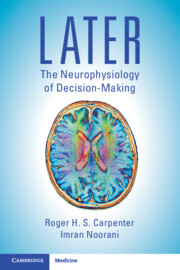Book contents
Chapter 5 - LATER and the Brain
Published online by Cambridge University Press: 08 September 2023
Summary
Structurally, the human brain is a mess. The problem is the way in which it has evolved: the bulk of what fills our skulls – the telencephalon, and especially the cerebral cortex – is relatively new, but it has not displaced the older and simpler structures seen in reptiles. Rather, the brain has evolved through accretion (Sarnat and Netsky 1974) (Figure 5.1): the older areas are still functional – indeed they are much the more important – but they have come to be supplemented and regulated by the newer areas, which provide improved overall integration and prediction through the massive bands of associational fibres that link every part of cerebral cortex to every other. In addition, these newer and ‘higher’ areas send and receive huge nerve tracts that have elbowed the older structures aside and distorted their shapes, making the relationships between their parts hard to discern.
- Type
- Chapter
- Information
- LATERThe Neurophysiology of Decision-Making, pp. 80 - 94Publisher: Cambridge University PressPrint publication year: 2023



